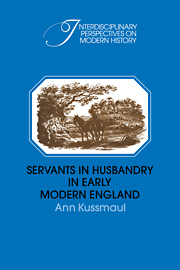Book contents
- Frontmatter
- Contents
- List of figures
- List of tables
- TO MY PARENTS
- Preface
- Part I Servants and labourers
- Part II Form and practice
- 3 Life and work
- 4 Hiring and mobility
- 5 Entry into and exit from service
- Part III Change
- Appendix 1 ‘Servants’ and ‘labourers’ in early modern English
- Appendix 2 Age and sex
- Appendix 3 Legal control of mobility
- Appendix 4 Statute Sessions and hiring fairs in England, sixteenth to nineteenth centuries
- Appendix 5 The Holland, Lincolnshire, Statute Sessions
- Appendix 6 Compulsory service
- Appendix 7 Speculations on the origin of the institution
- Appendix 8 The 1831 census
- Notes
- Bibliography
- Index
- Frontmatter
- Contents
- List of figures
- List of tables
- TO MY PARENTS
- Preface
- Part I Servants and labourers
- Part II Form and practice
- 3 Life and work
- 4 Hiring and mobility
- 5 Entry into and exit from service
- Part III Change
- Appendix 1 ‘Servants’ and ‘labourers’ in early modern English
- Appendix 2 Age and sex
- Appendix 3 Legal control of mobility
- Appendix 4 Statute Sessions and hiring fairs in England, sixteenth to nineteenth centuries
- Appendix 5 The Holland, Lincolnshire, Statute Sessions
- Appendix 6 Compulsory service
- Appendix 7 Speculations on the origin of the institution
- Appendix 8 The 1831 census
- Notes
- Bibliography
- Index
Summary
The notion of an institution implies a certain rigidity of form. Its rules, once learned, become the tacit regulators of the behaviour of the people whose actions are the institution itself. Service in husbandry was a simple institution with three rigid rules, three defining characteristics:
It was not an adult occupation, but a status and occupation of youths, a stage in the progression from child living with parents to married adult living with spouse and children.
It was a contractual institution; the contract was annual and renewable.
Servants in husbandry were maintained in the farmer's family.
These characteristics were found wherever the institution was common and unquestioned, both in sixteenth-century Middlesex and twentieth-century Yorkshire.
Within these constraints, modest variations in behaviour were possible, and can be observed at all times. The argument of the next three chapters is that until the late eighteenth century, and after that in the north and west, the form of the institution retained its useful tacit rigidity. Part II is thus devoted to a description of service in husbandry as it was normally practised; the two chapters of Part III, which are devoted to change in the incidence of the institution, will demonstrate, first, how important was the rigidity of form in early modern England, and second, how complete was the decay in form in the south and east after 1790.
Contract and law
For the most part, service in husbandry was a private institution, practised within the farmer's family, defined not by law but by custom.
- Type
- Chapter
- Information
- Servants in Husbandry in Early Modern England , pp. 31 - 48Publisher: Cambridge University PressPrint publication year: 1981
- 1
- Cited by



